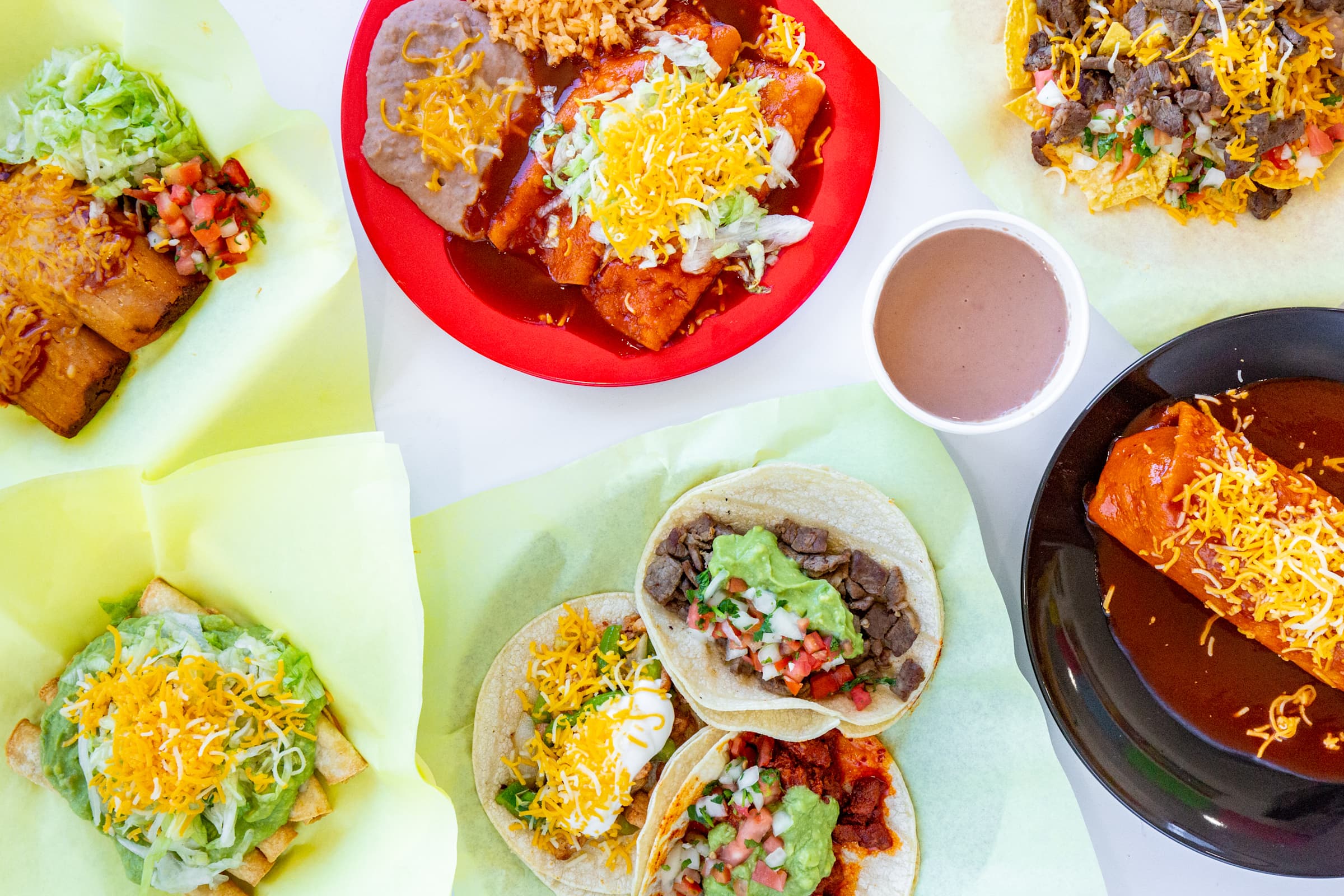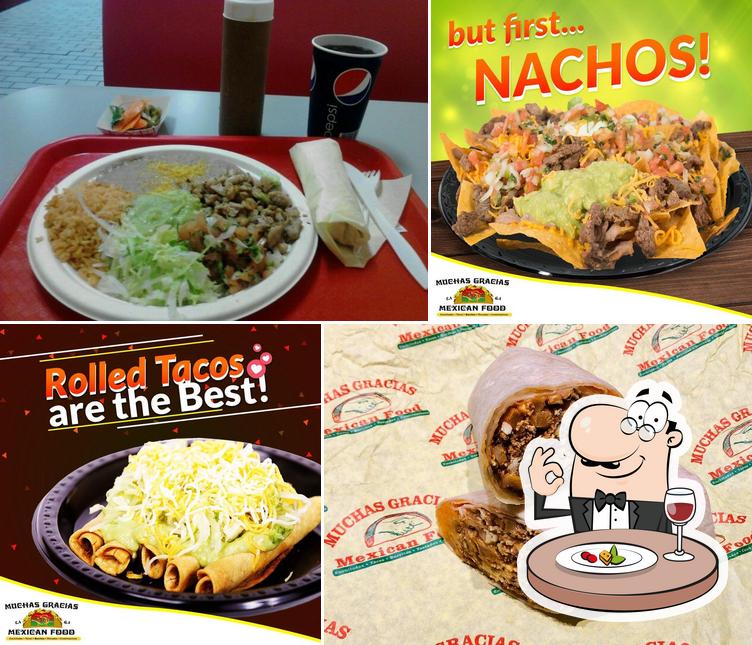Embark on a tantalizing journey as we delve into the colourful world of Muchas Gracias Mexican Meals. This culinary masterpiece, steeped in historical past and custom, beckons us to savor its flavors and embrace its cultural significance.
From the bustling streets of Mexico Metropolis to the tranquil shores of Oaxaca, Mexican delicacies has captivated style buds worldwide. Be a part of us as we discover the regional variations, important components, and beloved dishes that make this delicacies actually distinctive.
Mexican Delicacies Historical past
Mexican delicacies is a various and flavorful mix of indigenous, European, and African influences. Its roots may be traced again to the traditional civilizations of Mesoamerica, such because the Mayans and Aztecs, who cultivated crops like corn, beans, and squash.
The arrival of the Spanish within the sixteenth century introduced new components and cooking strategies to Mexico, which have been steadily integrated into the native delicacies. These included wheat, rice, dairy merchandise, and spices like cumin and coriander.
Influences of Completely different Cultures
- Indigenous Influences:The inspiration of Mexican delicacies lies within the indigenous cultures of Mesoamerica, with components like corn, beans, squash, and chili peppers forming the core of many dishes.
- Spanish Influences:The Spanish launched wheat, rice, dairy merchandise, and spices, which have been built-in into Mexican cooking, resulting in the creation of dishes like tortillas, tamales, and mole sauces.
- African Influences:Enslaved Africans introduced their very own culinary traditions to Mexico, together with the usage of okra, plantains, and palm oil.
- French Influences:Within the nineteenth century, French delicacies influenced Mexican cooking, notably within the higher lessons. This led to the adoption of strategies like baking and the usage of sauces.
Timeline of Important Occasions
- Pre-Columbian Interval (earlier than 1519):Indigenous civilizations develop their very own distinctive culinary traditions, based mostly on corn, beans, and squash.
- Spanish Conquest (1519-1521):Spanish explorers introduce new components and cooking strategies, resulting in the fusion of indigenous and European cuisines.
- Colonial Interval (1521-1821):Mexican delicacies continues to evolve, with the gradual incorporation of African influences.
- Independence (1821):Mexico positive aspects independence from Spain, and its delicacies begins to tackle a extra distinct nationwide character.
- nineteenth Century:French affect turns into distinguished in Mexican cooking, notably among the many elite.
- twentieth Century:Mexican delicacies positive aspects worldwide recognition and turns into a preferred culinary vacation spot.
Elements and Flavors

Mexican delicacies is famend for its vibrant flavors and distinctive mix of components. The inspiration of Mexican cooking lies in a trinity of staples: corn, beans, and chiles.
Corn, in its varied types, is a flexible ingredient utilized in tortillas, tamales, and pozole. Beans, wealthy in protein and fiber, are a staple in soups, stews, and as a facet dish. Chiles, the center and soul of Mexican delicacies, present a variety of flavors, from delicate to fiery.
Spices, Herbs, and Chiles
Mexican cooking is characterised by its daring use of spices, herbs, and chiles. Cumin, oregano, and cilantro are ubiquitous, including heat, depth, and freshness to dishes. Chiles, with their various levels of warmth, are central to Mexican delicacies, including taste, colour, and a definite aroma.
Essentially the most generally used chiles embody jalapeños, serranos, and habaneros. Jalapeños provide a average warmth stage and are sometimes used recent or pickled. Serranos are hotter than jalapeños and supply a smoky taste. Habaneros, one of many hottest chiles, are used sparingly so as to add intense warmth.
Attribute Flavors and Aromas
Mexican meals is thought for its vibrant flavors and engaging aromas. The mix of spices, herbs, and chiles creates a harmonious stability of warmth, acidity, and sweetness. The usage of recent components, comparable to tomatoes, onions, and garlic, provides a layer of brightness and freshness.
The aromas of Mexican cooking are equally fascinating. The pungent scent of chiles, the earthy notes of cumin, and the refreshing perfume of cilantro mix to create an irresistible attract.
Widespread Dishes
Mexican delicacies is famend for its vibrant flavors, numerous dishes, and regional variations. From the scorching fajitas to the hearty pozole, there’s an array of fashionable dishes that showcase the culinary richness of Mexico.
Most Widespread Mexican Dishes, Muchas gracias mexican meals
| Dish Title | Description | Area of Origin | Key Elements |
|---|---|---|---|
| Tacos | Corn or wheat tortillas crammed with varied meats, seafood, greens, and sauces | All through Mexico | Tortillas, fillings (e.g., carnitas, al pastor, fish), toppings (e.g., onions, cilantro, salsa) |
| Enchiladas | Corn tortillas rolled and crammed with meat, cheese, and beans, topped with a chili sauce | Central and Southern Mexico | Tortillas, fillings (e.g., rooster, beef, cheese), chili sauce, toppings (e.g., onions, bitter cream) |
| Pozole | Hearty soup made with hominy, meat, and a flavorful broth | All through Mexico | Hominy, meat (e.g., pork, rooster), broth, toppings (e.g., radishes, onions, lime) |
| Fajitas | Grilled meat (normally beef or rooster) served on a scorching skillet with tortillas and toppings | Northern Mexico (Texas-Mexico border) | Grilled meat, tortillas, toppings (e.g., onions, peppers, salsa) |
Cooking Methods: Muchas Gracias Mexican Meals

Mexican delicacies boasts a wealthy array of conventional cooking strategies which have been handed down via generations. These strategies, starting from grilling and roasting to stewing and braising, impart distinct flavors and textures to the dishes.
One of the iconic strategies is grilling, or “asado,” which entails cooking meats and greens over an open flame. This methodology infuses the meals with a smoky, charred taste and a crispy exterior. Roasting, or “hornear,” is one other widespread method, the place meats, greens, and spices are cooked in an oven, leading to tender and flavorful dishes.
Specialised Tools
Mexican delicacies additionally makes use of specialised gear to reinforce the cooking course of. Comals, giant flat griddles product of forged iron or clay, are used for cooking tortillas, grilling meats, and sautéing greens. Molcajetes, conventional stone mortars and pestles, are used to grind spices, herbs, and chiles, creating flavorful pastes and sauces.
Cultural Significance

Mexican meals shouldn’t be merely a delicacies; it’s a tapestry of flavors, traditions, and cultural heritage that deeply permeates Mexican society. It serves as a bridge between generations, connecting households and communities, and performs a pivotal position within the celebration of life’s milestones and the rhythm of each day life.
Meals in Mexico transcends mere sustenance; it’s an expression of identification, an emblem of unity, and a supply of delight. It weaves its manner into the material of Mexican festivals, celebrations, and each day rituals, shaping the cultural panorama of the nation.
Position in Festivals and Celebrations
Mexican festivals are vibrant and colourful affairs the place meals takes heart stage. From the normal tamales and pozole served throughout Christmas to the frilly mole dishes ready for Day of the Lifeless, every dish carries cultural significance and provides to the festive ambiance.
Throughout these celebrations, households and mates collect across the desk, sharing laughter, tales, and the enjoyment of breaking bread collectively. Meals turns into an emblem of unity, fostering a way of belonging and strengthening group bonds.
Every day Life and Household Traditions
In Mexican each day life, meals is an integral a part of the household routine. Conventional dishes are handed down from era to era, preserving culinary heritage and connecting households to their roots.
Breakfast, lunch, and dinner usually are not simply meals; they’re alternatives for households to return collectively, share tales, and create reminiscences. The kitchen turns into the center of the house, a spot the place traditions are nurtured, and love is expressed via the sharing of meals.
Significance of Household and Neighborhood
Mexican culinary traditions place nice emphasis on household and group. Prolonged households usually collect for Sunday meals, sharing giant platters of conventional dishes and having fun with one another’s firm.
Neighborhood occasions, comparable to weddings, baptisms, and funerals, are additionally centered round meals. Neighbors and mates contribute dishes, making a communal feast that celebrates the event and strengthens the bonds throughout the group.
FAQ Insights
What are the origins of Mexican delicacies?
Mexican delicacies traces its roots to historic Mesoamerican civilizations, with influences from Spanish, French, and different European cultures.
What are the important thing components utilized in Mexican cooking?
Important components embody corn, beans, chiles, tomatoes, onions, and garlic.
What’s the significance of spices and herbs in Mexican delicacies?
Spices and herbs, comparable to cumin, oregano, and cilantro, add depth and complexity to Mexican dishes.
What are some fashionable dishes in Mexican delicacies?
Widespread dishes embody tacos, burritos, enchiladas, tamales, and pozole.
What are some conventional cooking strategies utilized in Mexican delicacies?
Conventional strategies embody grilling, roasting, stewing, and utilizing specialised gear like comals and molcajetes.



/cdn.vox-cdn.com/uploads/chorus_image/image/63566350/MiPueblo_115.0.jpg?resize=600&w=600&ssl=1)
